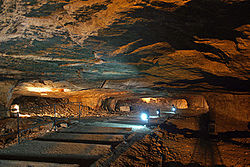Cavemen
Eruvin 61
“If a man spent Shabbat in
. . . a cave, even though it was like the cave
of Zedekiah king of Judah , he may walk through the
whole of it and two thousand cubits beyond.”
The daf is obviously talking about a very large cave. What is
the cave of King Zedekiah Judah , escaped from the
Babylonians. The escape is mentioned in the book of Jeremiah, chapter 52.
Zedekiah and his soldiers escape from Jerusalem
after the Babylonians breach the wall of the city. He is captured near the
plains of Jericho .
But there is no cave mentioned in the text.
Rashi again comes to our rescue (here, and with more detail in Ezekiel
12: 13) by telling us about a huge cave that stretched from Zedekiah’s house
until the plains of Jericho .
Where is this cave? Clearly it was known in the time of the
Tannaim. And indeed we come across mentions of Zedekiah’s Cave from the time of
the Gemara, through the Middle Ages and up until modern times. Today you can go
to the Old City
While the cave is associated with Zedekiah (and occasionally mixed up with the underground tunnel built by
Hezekiah – those confusing kings of Judah ), on closer examination the
story does not connect. First of all, the cave is a dead end. Rather than being
a tunnel from Jerusalem to Jericho , it begins near Damascus Gate and
goes underneath the Muslim Quarter and ends with a wall. It would make a good
hideout but a poor escape route. Second, the cave is clearly not a natural cave
but a quarry – you can see exactly how the stones were cut out of the bedrock.
The technique of stonecutting brings us inexorably to another king who lived five hundred years after Zedekiah: Herod the great builder of Jerusalem .
So with so many kings to choose from, why is the cave also called “King Solomon’s Quarry?”
So with so many kings to choose from, why is the cave also called “King Solomon’s Quarry?”
When it was rediscovered in the nineteenth century, the Freemasons in Jerusalem said that such an amazing building site must belong to the greatest builder of all, their patron King Solomon. They were so taken with the site that they held their annual meetings there.
And how was the cave rediscovered? When the Ottoman Turks rebuilt the walls aroundJerusalem
in the sixteenth century, they closed the entrance to the cave for security
reasons. From then on, the cave took on an almost legendary aspect – people
knew it existed but didn’t know where it was. One day in 1854, an English
explorer named James Barkley was walking his dog when the dog disappeared. He
followed the sound of barking to . . . an opening in the ground that led to a
vast chamber. He returned later that night to explore the cave under cover of
darkness and realized that this must be the legendary Zedekiah’s Cave.
And how was the cave rediscovered? When the Ottoman Turks rebuilt the walls around
We don’t know if the rabbis in Eruvin meant the cave that we
know of near the Damascus Gate. Perhaps they knew about Zedekiah’s real escape
route and we will find that one day as well. Meanwhile, you can visit
Zedekiah’s/Solomon’s/Herod’s cave and be awed.






Paid the cave a visit yesterday and then wrote about it myself. Pretty awesome indeed.
ReplyDelete